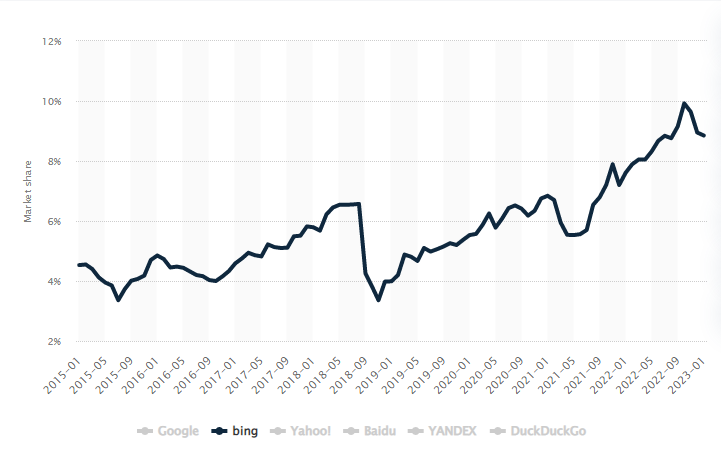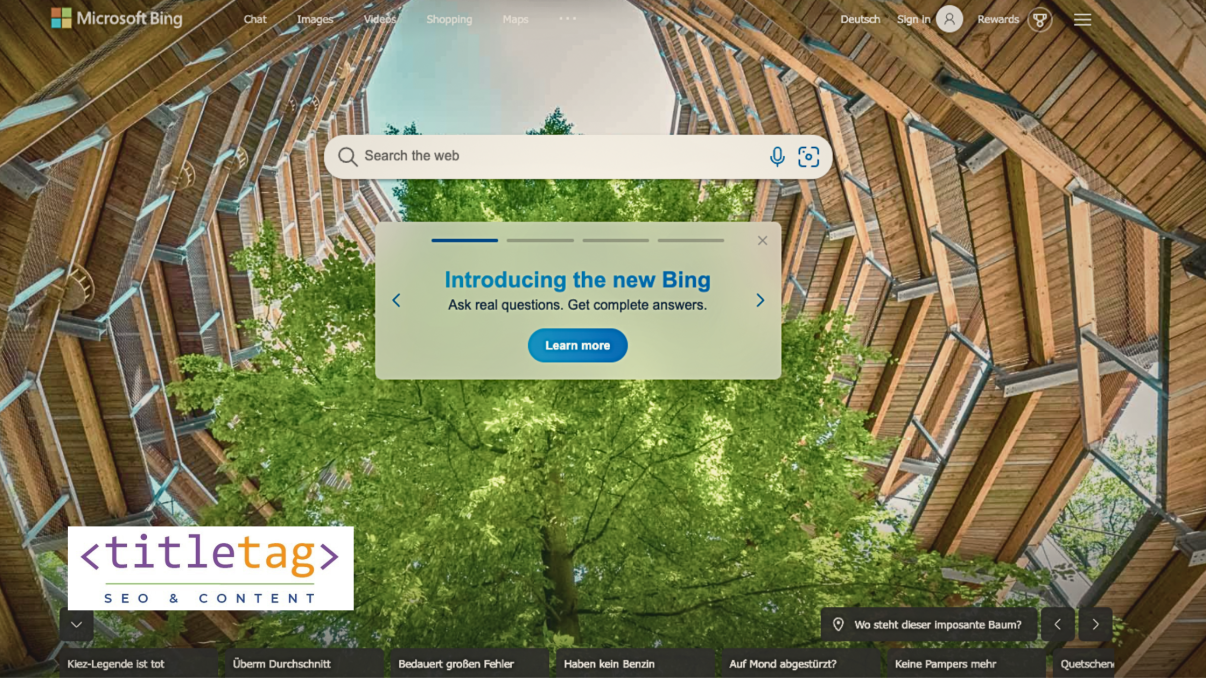The recent news of a multi-million dollar investment in startup OpenAI by Microsoft has sparked many rumors about the Redmond-based company’s willingness to take over the most promising of OpenAi’s products: ChatGPT.
In reality, the collaboration between the two companies goes back a long way: although it did not hit as many headlines before as it does now, back in 2019 and 2021 Microsoft had already invested in this promising conversational artificial intelligence startup.
On January 23rd, in a joint statement, the two companies confirmed the continuation of this partnership, something that (together with ChatGPT’s incredible popularity and huge user base) has raised questions about how this move could affect the search engine industry.
With Google currently dominating market share globally, many wonder whether through the possible future integration of ChatGPT’s technology into Bing, Microsoft could challenge Google’s dominance.
In this article, we will explore how Microsoft’s eventual acquisition or integration of ChatGPT could affect the search engine industry and what it means for the future of search.
What is ChatGPT?
ChatGPT is what we could define as the “flagship product” of OpenAI, a conversational artificial intelligence startup (although it defines itself as a non-profit research lab) founded by Sam Altman (the public face of the company) and Elon Musk in 2015.
OpenAI with ChatGPT specializes in developing user-friendly technology for natural language processing and understanding. Its technology can be used to create a myriad of solutions: from chatbots and virtual assistants that can provide personalized and intuitive responses to user queries, to compiling code in virtually any programming language and much more.
This technology has become increasingly popular in recent years as more businesses aim at automating their customer service and support functions.
Microsoft´s Acquisition of ChatGPT
Microsoft’s increasingly conspicuous investment in the development of ChatGPT is a strategic move that could help them compete with Google in the search engine industry.
While Google has been the dominant player in this space for years, Microsoft has been working hard to catch up, investing heavily in the development of its search engine, Bing, and steadily gaining market share in recent years.

By incorporating ChatGPT’s conversational artificial intelligence technology, Microsoft could create a more personalized and intuitive search experience for users: this could give them an advantage over Google.
How ChatGPT’s technology could help Microsoft compete with Google
There are several areas in which ChatGPT’s technology could help Microsoft compete with Google in the search engine industry.
Below we share the ones we consider most relevant or that could be implemented faster.
Voice Search
Voice search has become increasingly popular in recent years, with more and more people using virtual assistants such as Siri and Alexa to search for information.
Google itself confirmed that 20% of searches in Google apps are conducted by voice.
By integrating ChatGPT’s conversational artificial intelligence technology into Bing, Microsoft could create a more natural and intuitive voice search experience for users. This could help them stand out from Google, which has been criticized for its lack of personalisation in voice search.
Chatbots
Like voice search, chatbots are becoming increasingly popular in customer service and support functions, as they can provide quick and efficient responses to customer queries.
The latest market projections indicate that the chatbot market will reach $4.9 trillion by 2032 (almost six times its current value).
By integrating ChatGPT technology into its chatbots, Microsoft could create a more human experience for users. This could help them stand out from the competition and provide a better user experience.
As computer programmes that use artificial intelligence and natural language processing to simulate human conversation, chatbots can be integrated into messaging platforms, websites and applications, and can be used for a variety of other purposes, including sales and marketing.
The ability to provide users with quick answers to frequently asked questions, help them navigate websites or apps, and even make product recommendations based on the user’s preferences becomes a competitive advantage over traditional customer service channels such as phone or email.
A chatbot provides 24/7 support, which is especially useful for businesses that operate globally. They can also handle multiple queries simultaneously, which can help reduce waiting times for users.
Personalization
One area in which Google has been criticized for is its lack of personalisation in search results. By integrating ChatGPT technology into Bing, Microsoft could create a more personalized search experience for users, standing out compared to Google and providing a better experience for its users.
Personalisation refers to the ability of a search engine to provide users with search results that are tailored to their individual preferences and interests.
While Google uses some personalisation factors, such as location and search history, its algorithm relies primarily on keyword relevance and page authority (a legacy of its core algorithm, the importance of which Google has been trying to reduce for years through updates that have primarily targeted link building practices and low-value content generation).
By integrating ChatGPT’s conversational artificial intelligence technology into Bing, Microsoft could create a more personalized search experience for users.
In addition, this same personalisation can also be used to improve the relevance of the ads shown to users, which are likely to be more relevant. This would lead to improve the effectiveness of advertising campaigns and attract more advertisers in Microsoft Ads (formerly Bing Ads), improving the current market share of 18.3%.
Challenges for Microsoft
While ChatGPT’s integration with Bing has the potential to help Microsoft challenge Google for leadership in the search engine industry, there are a number of challenges that will need to be overcome.
Market share
Google currently dominates the search engine industry with a massive market share. It will be difficult for Microsoft to overcome this dominance and gain a more significant market share immediately.
Market share is a major challenge for Microsoft in its efforts to compete with Google in the search engine industry. Google currently dominates market share with a massive user base and loyal following, although in the last five years the Mountain View company has lost some ground, going from 92% market share to the current 85%.
Google’s dominance in the market could make it more complex for Microsoft to gain significant market share, as this will only be achieved by getting users of one platform to switch to the other.
The vast majority of users are accustomed to using Google and may hesitate to switch to Bing, even if Microsoft offers a better search experience. In addition, many companies and organizations rely on Google for advertising and search engine optimization, which further reinforces Google’s dominance in the market.
User loyalty
As mentioned above, Google has a loyal user base that may be difficult for Microsoft to conquer. Many users are accustomed to using Google and may be hesitant to switch to Bing.
User loyalty is a major challenge for Microsoft in its efforts to compete with Google in the search engine industry. Google has a massive user base that has become accustomed to using its search engine. Many users have developed a sense of loyalty to Google and may hesitate to switch to Bing, even if Microsoft offers a better search experience.
User loyalty (fanbase) is a common phenomenon in the technology industry, where users become attached to a particular brand or product (obvious examples are the endless discussions between users of iOS and Windows operating systems, or deciding whether an Android smartphone or an iPhone is better).
This brand attachment can be based on several factors, including familiarity, trust and emotional connection. In the case of Google, many users have been using its search engine and products for years, developing a sense of familiarity and trust in the brand.
Algorithmic advantage
Google’s algorithm is very advanced and has been refined for many years, although nowadays not everyone is happy with the frequent changes that often cause a real earthquake in the search results.
Still, it will be difficult for Microsoft to match this level of sophistication in its algorithms and therefore it is safe to say that the algorithmic advantage is another major challenge for Microsoft in its efforts to compete with Google in the search engine industry.
Google’s algorithm is based on several factors (more than 200 according to the most recent studies), including keyword relevance, page authority and user behavior. Google uses Big Data and machine learning from its own artificial intelligence to analyze large amounts of data and provide users with search results that manage to minimize the gap between search intent and the results delivered.
Although Bing has made significant progress in improving its algorithm in recent years, it still lags behind Google in terms of sophistication and accuracy. This algorithmic disadvantage makes it difficult for Microsoft to provide users with the same level of precision and relevance that Google can offer.
Conclusion
The increasingly close alliance between OpenAI and Microsoft could be an interesting development in the search engine industry, as well as opening up new business scenarios.
While it remains to be seen how effective this eventual integration will be in challenging Google’s dominance, it is clear that Microsoft is committed to improving its search engine and making Bing a better user experience.
By incorporating ChatGPT’s conversational artificial intelligence technology, Microsoft could create a more personalized and intuitive search experience for users, which could help it stand out from the competition and thus close the gap that now separates it from Google or even change the game completely.
As is often the case in the technology landscape, being among the early adopters often provides a competitive advantage. At Title Tag, we believe that AI will become an increasingly important tool and that it should be incorporated into the toolkit of any digital marketer, accompanying them in their day-to-day work. Shall we join you?

